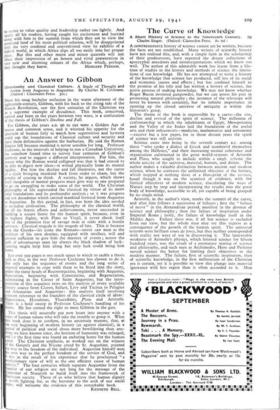An Answer to Gibbon
Christianity and Classical Culture. A Study of Thought and Action from Augustus to Augustine. By Charles N. Cochrane. (Oxford : Clarendon Press. 3os.)
FROM his snug bachelor seclusion in the warm afternoon of the eighteenth. century, Gibbon, with his back to the rising tide of the French Revolution, saw die first centuries of the Christian era as a supreme example of decadence. This book, conceived, carried and born in the years between two wars, is a confutation of the thesis of Gibbon's Decline and Fall.
For Gibbon, the years A.D. 96 to x92 were a Golden Age of reason and common sense, and it whetted his appetite for the spectacle of human folly to watch how superstition and hysteria could sap the foundations of Classical culture and security and leave them defenceless against the barbarian. He said the Roman Empire fell because mankind is never sensible for long. Professor Cochrane, in the intervals of helping to run a Canadian University, has somehow found time to survey four centuries of Gibbon's territory and to suggest a different interpretation. For him, the reason•why the Roman world collapsed was that it had ceased to be able to digest new ideas—it wilted physically from its mental rigidity. For him the decline and fall illustrates, not the curve of a cycle bringing mankind back from order to chaos, but the penalty of ceasing to think. A society, he argues, which shows itself incapable of mental progress must give way to one prepared to go on struggling to make sense of the world. The Christian philosophy of life superseded the classical by virtue of its more solid foundations and its profounder analysis ; so it was progress and not decadence which carried mankind forward from Augustus to Augustine. In this period, in fact, was born the idea needed to revitalise civilisation. The philosophy of the classical world, for all its heroic efforts and achievements, never succeeded in building a secure home for the human spirit, because, even in its highest flights, with Plato or Virgil, it never shook itself free of the primitive fear of savage man at odds with a hostile universe. Classical tragedy is the tragedy of fate. This is because even the Greeks—let alone the Romans—never saw man as the architect of his own destiny, equipped with intellect, will and passion sufficient to give him the mastery of events ; across the path of adventurous man lay always the black shadow of luck: cunning might help him along but only luck could bring him home.
Just over Soo pages is not much space in which to tackle a thesis such as this, in the way Professor Cochrane has chosen to do it. Not only has the sequence of events and the long series of imperial attempts to cope with them to be fitted into the story, under the three heads of Reconstruction, beginning with Augustus, Renovation, beginning with Constantine, and Regeneration, culminating in the Career of Saint Augustine, but the inter- retation of this sequence rests on the analysis of every available iterary source from Cicero, Sallust, Livy and Tacitus to Pelagius nd Athanasius and Augustine:_ this analysis itself involving onstant reference to the founders of the classical circle of ideas: ppocrates, Herodotus, Thucydides, ,Plato and Aristotle. ere is a bold sweep in Professor Cochrane's handling of his eme. He has earned the right to meet Gibbon in the gate.
This thesis will assuredly put new heart into anyone with a nse of human values who will take the trouble to grasp it. What s book does is to confirm, in no uncertain manner, that, at very beginning of modern history (as against classical), in a eriod of political and social chaos more bewildering than any- ing we have known since, the horizon of humanity was enlarged,
d for the first time was found an enduring home for the human pirit. The Christian synthesis, as worked out on the witness f the Gospels and the Nicene creed by St. Augustine, pointed e way to the freedom of the individual. Augustine himself won is own way to the perfect freedom of the service of God, and was as the result of his experience that he proclaimed " a evolutionary view of will as the one efficient cause of human ctivity." The four centuries which separate Augustine from the ounder of our religion are not long for the message of the rpenter of Nazareth to build itself into the framework of uropean society. Those of us who believe that human dignity worth fighting for, as the keystone to the arch of our social rder, will welcome the evidence of this remarkable book.
KENNETH BELL.


































 Previous page
Previous page